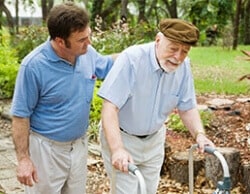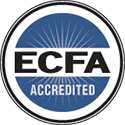Meeting Spiritual Needs in Long Term Care Settings

Many skilled nursing facilities, such as Advent Christian Village’s Good Samaritan Center, employ a chaplain. The chaplain is a minister or priest and is available as “religious” support for people living in nursing homes. Chaplains are sometimes overlooked as key players in nursing home care and as support for family members. What does a chaplain do and how can he or she be of help to family members?
The chaplain’s main responsibility is to help people move into a different phase of life with their faith and spiritual practices intact. At most nursing homes across the United States, the people who live there come from a variety of faiths, but most of them have participated in some form of worship throughout their lifetime. The chaplain coordinates and often leads group meetings, is available for one-to-one ministry, and is on-call for end-of-life care and ministry to grieving families.
Most of the time, chaplains lead worship services that include hymns, Bible reading, prayer, and a brief message. Other meetings may occur during the week such as small groups for prayer and Bible study sessions. The chaplain leads most of these activities, but also welcomes leaders from local churches, especially to lead specialized services such as Catholic mass, if he is not an ordained priest. For individuals with a different faith from theirs, the chaplain is sensitive to their preferences and assists them if possible.
When a person living in a nursing home appears discouraged, nursing staff will call for the chaplain to spend time with them. Often a compassionate listening ear is just what is needed. Some facilities also ask their chaplain to drive their residents to appointments. Taking someone to a medical appointment provides a valuable opportunity for a closer relationship between them. Like any pastor, the better a chaplain knows an individual, the more they can minister to them in a meaningful way.
Chaplains can also be a resource for family members when it comes to their loved one’s wellbeing. Family members who cannot visit often may call on the chaplain to visit their loved one when social interaction would be helpful. Although medical care is outside their abilities, they can provide spiritual and emotional care. Sometimes a friendly visitor is the best medicine of all.
End-of-life care, funeral planning, and after care for family and friends is a major part of any chaplain’s responsibility. During an individual’s final days, the chaplain assists by sitting with them, offering counsel and praying with and for them. Usually the nursing home tries to make sure there is someone at the bedside almost constantly at this point. The chaplain helps family members with this and sometimes takes a late night shift to relieve family or friends. When death occurs, the chaplain offers support and comfort for the family, and often assists with plans and arrangements that need to be made. Quite often he attends, takes part in or leads memorial services.
The chaplain is also available for the employees of the facility. Staff members also have spiritual needs, and particularly when dealing with the loss of someone they have cared for daily, the chaplain can be a great source of comfort. For those workers who are either not involved in a church of their own or whose schedules do not allow them to attend a house of worship, the chaplain may serve as their pastor and counselor. For some, approaching their coworker with a question may seem less intimidating than going to their own pastor.
The chaplain may not have a medical degree, but they are an essential part in the care, wellbeing and fulfillment of the individuals of a skilled nursing facility. Almost every day, a few individuals or staff members will stop the chaplain for a chat. This visit may be related to a crisis, a question, a need for prayer, or some other form of support — or it may be just a time of friendly visitation — but it is almost always a worthwhile interaction with one who has time to listen.



